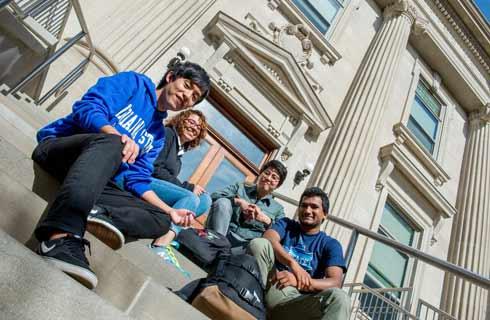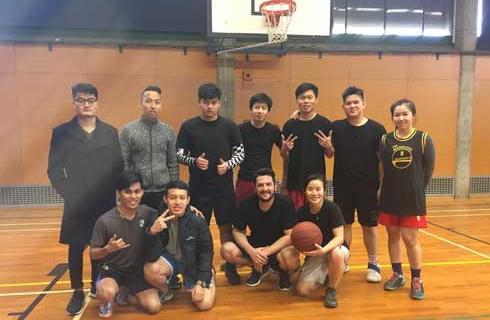- IDP China>
- 课程库>
- 教育学>
- 教育>
- 教育,特定学科领域>
- Master of Arts in Education - English Education (Media Literacy Education)
教育文学硕士-英语教育(媒体素养教育)
Master of Arts in Education - English Education (Media Literacy Education)

学历文凭
Masters Degree

专业院系
English Language Arts Education K-12

开学时间

课程时长

课程学费

国际学生入学条件
The English Education M.A.E. and Ph.D. programs adhere to the University of Florida's Graduate School's minimum requirements for admission. Both programs require a 3.0 GPA in upper-division undergraduate work.
English Education faculty also consider the written statement of purpose, the academic potential evident in three letters of recommendations, a student's academic background (i.e., a B.A. or M.A. in English or a substantial background in literature, writing and communication), and a resume. Admission decisions are based on multiple sources of numerical and qualitative data and are framed by the goals of the program.
For applicants from countries where English is not the ofcial language, a minimum score on one of these English Language Skills tests, IELTS - 6.0,TOEFL IBT- 80, PBT- 550.
IDP—雅思考试联合主办方

雅思考试总分
6.0
了解更多
雅思考试指南
- 雅思总分:6
- 托福网考总分:80
- 托福笔试总分:550
- 其他语言考试:MELAB - 77.
CRICOS代码:
申请截止日期: 请与IDP顾问联系以获取详细信息。
课程简介
The Media Literacy Education specialization provides an opportunity for graduate students to investigate the processes of using popular media culture and Internet texts to support literacy growth. Students earning a degree in Curriculum and Instruction can add a 12-hour Media Literacy Specialization. Students may also elect to earn a Master's of Art in Education or a Ph. D. with a focus on Media Literacy Education.<br>Despite the significant role of media in US culture, students in US schools rarely are asked to interrogate media texts or to think critically about the role of media in contemporary culture. However, that reality is changing. All 50 states now include media literacy skills in curriculum standards. Furthermore, professional educational organizations, such as the National Council of Teachers of English, the National Council of Teachers of Science, The International Reading Association, and the National Council for the Social Studies all have professional guidelines and research strands that emphasize media literacy education in elementary classrooms and in academic disciplines.<br><br>Despite this trend, the growing emphasis on media texts and their role in literature, science, politics, health, and Information and Computer Technologies, can be problematic for educators. Most have had few opportunities to develop conceptual understandings of media or to identify appropriate methods for teaching media texts.<br><br>The Media Literacy Education specialization provides an opportunity for graduate students to investigate the processes of using popular media culture and Internet texts to support literacy growth. Students earning a degree in Curriculum and Instruction can add a 12-hour Media Literacy Specialization. Students may also elect to earn a Masters of Art in Education or a Ph. D. with a focus on Media Literacy Education.
相关申请
 预科
预科 奖学金
奖学金 实习机会
实习机会 在校学习
在校学习 跨境学习
跨境学习 校园授课-线上开始
校园授课-线上开始 在线/远程学习
在线/远程学习
学校排名

世界排名175
数据源:泰晤士高等教育世界大学排名
关于佛罗里达大学

佛罗里达大学是佛罗里达州内历史最悠久,最具规模的公立大学,亦为颇具威望的美国大学协会(Association of American Universities)成员之一;该校一向以多元化的学术教育闻名,尤其UF在国际教育方面已努力多年,经验老到,对于国际学生而言,该校所提供的服务、课程以及研究教学都深具口碑,因此每年慕名申请的国际学生人数相当多。根据校方统计,佛罗里达大学目前共有学生46,000人(大学部学生占72%),规模庞大,是美国前5大的大学之一。在众多学生中,国际学生约有2,700人。值得一提的是,UF学生虽多,平均素质都相当不错,获得国家级奖学金的学生人数在众多大学中名列前茅,因此可以说UF的学生是量与质兼备。学生男女比例现为48:52,学生中有24%为研究生,7%为建筑、牙医、法律、药学等专业学位项目。约有7,500名学生住在校内。约有26%的学生为少数族裔,包括7.9%的非洲裔美国人,10.1%的拉丁美裔人,6.5%的亚裔或太平洋岛民。在学术研究方面,UF的农学研究成果及推广教育为佛罗里达州的农业发展助益良多,而卡内基协会(Carnegie Commission)也曾评定UF是一所领导级的研究大学。UF是由21个专门院校、100多个研究、服务机构以及教育中心所组成,提供了超过100种大学部主修科系与近200项研究所课程,且多数的课程采小班制,一个班级通常少于25人,因此教学品质能维持在水准以上。佛罗里达大学的图书馆是佛州最大的信息资料库。大学一共有九个图书馆,约有四百万册图书杂志[17],同时也收藏有各种书信原稿、地图、录制的音乐影像等,涵盖几乎所有领域。更多的数字信息可以通过图书馆的网页在网络上浏览到,这些数字信息被称作佛罗里达大学数字收藏(The University of Florida Digital Collections,简称UFDC) 。George A. Smathers图书馆是最主要的图书馆,为几乎全部的院系提供服务。点这里查看图书馆列表,点这里查看佛罗里达大学数字收藏。佛罗里达大学有多个校区,其中最有名的两个校区是甘斯威尔(Gainesville)校区和坦帕(tampa)校区,位于甘斯威尔的校区又称北校区(在中国大陆地区又俗称北佛罗里达大学),位于坦帕的校区又称为南校区(在中国大陆地区又俗称南佛罗里达大学)。
本校相关课程

妇女研究文学硕士
学历文凭
Masters Degree
开学日期
课程费用总额


Master of Science in Wildlife Ecology and Conservation (Thesis)
学历文凭
Masters Degree
开学日期
课程费用总额


动物学理学硕士
学历文凭
Masters Degree
开学日期
课程费用总额


地质学硕士
学历文凭
Masters Degree
开学日期
课程费用总额


地理文学硕士
学历文凭
Masters Degree
开学日期
课程费用总额


具有专业经验的生物技术理学硕士
学历文凭
Masters Degree
开学日期
课程费用总额





















 美国
美国




